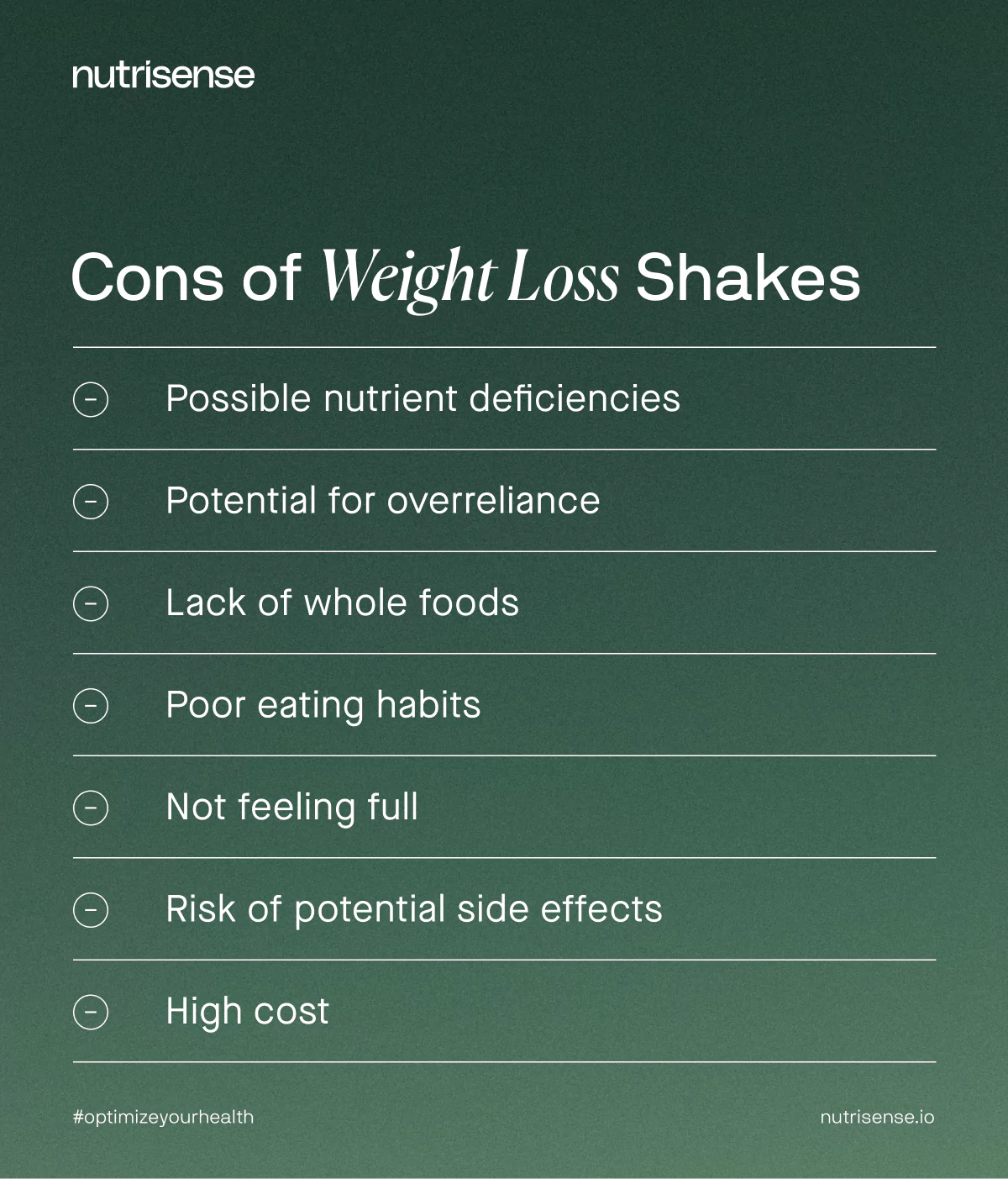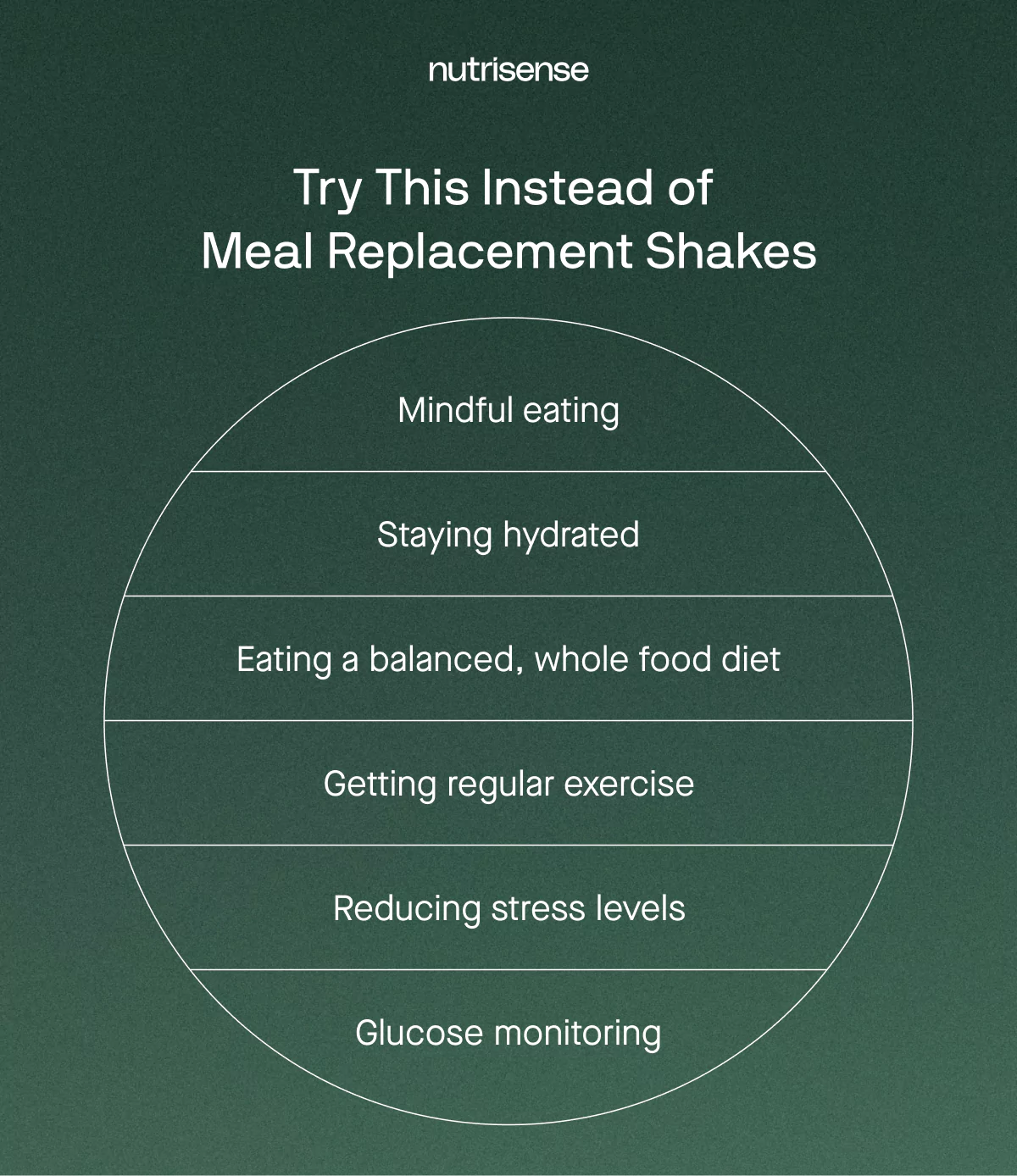Weight Loss Shakes for Women: Are They Worth It?

Key Takeaways
If you’re just beginning your weight loss journey, you may have considered weight loss shakes as a quick and nutritious dietary supplement that may make it easier to lose weight. Having a convenient, on-the-go meal replacement on hand may sound convenient, but you may be skeptical as to how nutritious they really are.
To make matters even more confusing, many of the popular shakes on the market are labeled with buzzwords like “keto,” “low-calorie,” “fat-burning,” or non-GMO.” You’re not alone if you’ve been wondering if any of these products actually help you to lose weight, or if it’s all just marketing.
In this article, we’ll dive into the science behind weight loss shakes so you know how they work and what your alternatives are so you feel your best as you work toward your weight loss goals.
What Is a Weight Loss Shake?

Weight loss shakes, also referred to as meal replacement shakes, are beverages that are advertised as an all-in-one meal replacement that can meet all of your nutritional needs. They are often sold in a grab-and-go bottle, or can easily be blended with water.
If you stick to having only a high-protein meal replacement shake at meal time, they provide a way of controlling calories to help combat overeating. Some of the benefits you can expect from popular weight loss shake brands like Orgain, Garden of Life, or Slimfast are:
- A high protein content
- Essential nutrients and vitamins
- Healthy fat content
- Dairy-free ingredients
- Low sugar content
Unfortunately, however, while they may seem like a convenient option and are often marketing towards women with weight loss goals, these shakes don’t contain whole foods, which can mean you’re missing out on several important nutrients. Instead, weight loss shakes tend to include artificial ingredients including flavors and preservatives that may ultimately have a negative impact on your health.
Is a Weight Loss Shake the Same as a Protein Shake?
The primary benefit of weight loss shakes is to help you to manage your calorie intake based on the “calories in, calories out” model, which forms the basis of many diets. Protein shakes, on the other hand, often containing casein or whey protein, aim to supplement your baseline caloric intake with high amounts of additional protein.
If your goal is to increase muscle strength or tone, a protein shake or smoothie can be an easy way to get extra protein into your body to boost recovery after a workout. Many protein shakes may, as a result, be higher in calories than weight loss shakes. These types of shakes often don’t contain added carbs, fiber, or fats.
The best meal replacement shakes on the market contain at least 20 grams of protein, which is important to keep you satiated, as well as other macronutrients. In fact, most weight loss shakes do in fact contain all of the macronutrients you’d find in a full meal—carbohydrates, fat, and protein—placing a bigger focus on supporting weight management.
How Does a Weight Loss Shake Affect the Body?

The primary benefits of weight loss shakes (in theory) are that they are low in calories, contain important vitamins such as vitamin C, vitamin D, and vitamin A, and are high in protein. Many of the popular brands of these shakes are also low in added sugar and contain superfood blends and probiotics.
In addition to restricting calories, weight loss shakes may facilitate weight loss by helping to ensure an adequate intake of protein. A review of weight regain following a period of dieting showed that the most effective diets in the long-term are those with increased intake of protein as well as those that are anti-inflammatory and promote balanced blood sugar.
Protein can keep you satiated for longer, and helps the body to maintain lean muscle mass, which boosts your metabolic rate. Extreme calorie restriction, however, may result in muscle loss as well as fat loss and undermine your goals, so it’s important to make sure you are not relying heavily on low-calorie meal replacements.
It’s also important to consider that many protein powders contain protein isolates, which strip away all of the nutritional value and essential vitamins of whole foods aside from the protein molecules themselves. If you’re looking for ways to increase your protein intake, opt for protein from whole foods, which will always provide the most nutrition.
Pea protein, for example, which is a common component of plant-based protein powders and some weight loss shakes, is not nutritionally equal to peas, and may lack the nutritional balance of protein that comes from whole food sources.
Are Weight Loss Shakes a Long-Term Solution?
Some weight loss shakes may be nutritionally balanced, and there is research to suggest that they can be effective for weight loss in some people, though longer-term research is still needed. At the same time, however, other research has shown that whole food sources of nutrients are more effective and better for overall health outcomes.
So, while it may not be harmful for some women to use weight loss shakes as a convenient nutritional supplement from time to time, long-term use may pose certain negative risks, and may even impact your mental health. For example, for some people, drinking weight loss shakes can take the pleasure out of food, and can even lead to an over-attentiveness to the foods you do eat and an overly restrictive mindset.
The Biggest Cons of Weight Loss Shakes for Women

At Nutrisense, we believe that whole food-based nutrition is an important foundation of any diet, including when you’re trying to lose weight. Despite some of the potential benefits of weight loss shakes, there are some important risks to keep in mind, and you should always consult a trusted healthcare professional or nutrition expert before adding new supplements to your diet.
Here are some of the top reasons to consider following a diet based on whole foods as a part of your weight loss journey.
Nutrient Deficiency
By consuming highly processed ingredients found in some shakes marketed for “weight loss,” you could unknowingly create nutritional imbalances that could sabotage your long-term weight-loss success and potentially negatively impact your gut health.
Potential for Overreliance
Weight loss shakes may be easy to take on-the-go or to consume quickly, but their simplicity shouldn’t make them your go-to, though, nor should they be viewed as a “quick fix” for losing weight. It’s important to avoid becoming reliant on the ease and convenience that may come from having quick access to meal replacement shakes.
Lack of Whole Foods

By nature of replacing meals, weight loss shakes limits how many whole foods you consume. Depending on the person, reliance on these shakes can lead to decreased intake of fiber, which is important for helping you to maintain a healthy weight by promoting satiety, keeping your gut microbiota healthy, and increasing your sensitivity to insulin.
You’ll also likely consume fewer phytonutrients, which include the antioxidants that lower inflammation, keep your immune system healthy, and support overall health.
Poor Eating Habits
Listening to your body is a healthy habit that takes practice. Learning to identify your body’s internal, innate cues rather than suppressing them and forming unhealthy habits can help you to lose weight long-term.
Not Feeling Full
Liquid calories might not provide the same feeling of fullness as whole foods. That’s because hunger is triggered in both chemical and physical ways. You might have heard of ghrelin, the hunger hormone, but your gut also has sensory neurons that detect the physical stretching of the gut, which the brain interprets as fullness.
Potential for Side Effects
As with any processed foods, weight loss shakes have the potential to cause digestive issues by irritating the gut lining. They may also contain hidden ingredients that can cause side effects in some people, so make sure to read labels carefully.
Cost
Weight loss shakes can be pricey, and in some cases can add up to be more expensive than whole foods over time. Your budget is an important factor in losing weight to minimize any unnecessary stress.
What to Try Instead of Meal Replacement Shakes for Weight Loss

At best, weight loss shakes can be helpful as a temporary tool on your path to weight loss. A complete meal made up of whole foods, however, is generally a healthier and more sustainable option to ensure long-term success, because you won’t over-restrict real, nutritious foods that are ideal for weight loss in the right portions.
Balanced, Whole Food Diet
A balanced diet prepared with lots of colorful whole foods contains natural macro and micronutrients, which may be naturally more bioavailable than their supplement counterparts. Consuming a variety of fresh, high-quality unprocessed foods can help ensure adequate nutrition and have a positive long-term impact on your weight and health.
Regular Exercise
Getting regular strength training and cardio exercise into your routine can provide the dual benefits of calorie burning and muscle building. Incorporating regular exercise can not only increase your basal metabolic rate, but can boost your mood and help you to feel more confident in your body.
Glucose Monitoring

Different foods may affect your blood sugar in different ways, which is why learning what dietary choices and lifestyle habits may increase your glucose levels can be so insightful. Through programs like Nutrisense's CGM Program, you can discover how to make better choices that can lead to appetite control, balanced hormones, and even more energy throughout the day.
Hydration
Staying hydrated is essential for metabolism and digestive health and is even associated with higher energy levels. When you’re aiming to lose weight, proper hydration can help you to consume fewer calories by contributing to feelings of fullness.
Mindful Eating
Mindful eating is a practice that involves chewing slowly, savoring each bite, and being present during meals. This practice can help you to recognize your body’s hunger signals so you eat only when you’re truly hungry and stop when you’re full, reducing overconsumption. You might also practice breathing exercises before meals to put your nervous system into a state of calm, which has been shown to improve digestion.
Stress Management

If you feel like you’re doing all the right things to lose weight and aren’t seeing results, stress could be the culprit. Sources of stress vary from emotional drama to nutrient imbalances, and can lead to increased appetite, cravings, and even high glucose levels since cortisol releases glucose into the bloodstream.
Depending on your unique needs, adopting a breathwork or mindfulness practice, working out in a way that feels good or trying somatic exercises, sleeping well, staying hydrated, and eating a nutrient-dense, whole foods-based diet can help you to relieve stress.
Find the right Nutrisense programto turn insight into progress.
Go Beyond Glucose Data with Nutrisense
Your glucose can significantly impact how your body feels and functions. That’s why stable levels are an important factor in supporting overall wellbeing. But viewing glucose isn't enough. Nutrisense, you’ll be able to learn how to use your body's data to make informed lifestyle choices that support healthy living.
One-to-one coaching
Sign up to access insurance-covered video calls to work with a glucose expert: a personal registered dietitian or certified nutritionist who will help tailor your lifestyle and diet to your goals.
Monitor and measure what matters
With the Nutrisense CGM Program, you can monitor your glucose with health tech like glucose biosensors and continuous glucose monitor (CGM)s, and analyze the trends over time with the Nutrisense App. This will help you make the most informed choices about the foods you consume and their impact on your health.
Find your best fit
Ready to take the first step? Start with our quiz to find the right Nutrisense program to help you take control.

Heather is a Registered and Licensed Dietitian Nutritionist (RDN, LDN), subject matter expert, and technical writer, with a master's degree in nutrition science from Bastyr University. She has a specialty in neuroendocrinology and has been working in the field of nutrition—including nutrition research, education, medical writing, and clinical integrative and functional nutrition—for over 15 years.




